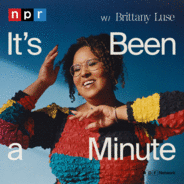
Kultur & Gesellschaft
It's Been a Minute Folgen
Want in on a secret? Your likes and dislikes didn't develop by accident. There are subtle and not-so-subtle forces around you, shaping what you think, how you act, and even who you think you are. Brittany Luse is here to break the spell and help you feel wiser in a society that makes things blurry.THE BEST POP CULTURE PODCAST AWARD WINNER AT THE 2025 SIGNAL AWARDSIt’s Been A Minute with Brittany Luse is the best podcast for understanding what’s going on in culture right now, and helps you consume it smarter. From how politics influences pop culture to how identity influences tech or health, Brittany makes the picture clearer for you every Monday, Wednesday, and Friday.It’s Been A Minute reaches millions of people every week. Join the community and conversation today.If you can't get enough, try It's Been a Minute Plus. Your subscription supports the show and unlocks a sponsor-free feed. Learn more at plus.npr.org/itsbeenaminute
Folgen von It's Been a Minute
-
Folge vom 06.09.2022t.A.T.u's 'All The Things She Said' still runs through our headsThe Russian pop duo t.A.T.u released their smash single "All The Things She Said" 20 years ago this week. To this day, the bop is a queer staple, but should it be?From t.A.T.u to Britney Spears and Madonna, the early 2000s were full of straight women dabbling in queerness for profit. In this episode, senior producer Barton Girdwood sits down with author Jill Gutowitz (Girls Can Kiss Now) to talk about how these moments gave young queer millennials a taste of their sexuality even though it was all an act. They discuss whether or not a false representation can still be meaningful, and how the basic formula of "All The Things She Said" gets lesbianism right — even though so much of it is wrong.You can follow us on Twitter @NPRItsBeenAMin and email us at IBAM@npr.org.Learn more about sponsor message choices: podcastchoices.com/adchoicesNPR Privacy Policy
-
Folge vom 02.09.2022The game has changed for D&D and 'A League of Their Own'For a long time, Dungeons & Dragons was stereotyped as a game for nerdy young white guys in their parents' basement. But not anymore — the game has exploded in popularity and players of all backgrounds are joining in. Guest co-host Andrea Gutierrez talks to Jasmine Bhullar and Persephone Valentine, both content creators and dungeon masters, about how D&D has become an exciting medium for marginalized people to tell new kinds of fantasy stories.Then, Andrea sits down with Chanté Adams, star of the new Amazon Prime series A League of Their Own. Adams plays Maxine Chapman, a queer Black woman loosely based on historic female players in the Negro Leagues. The role also expands on a non-speaking, unnamed character in the original 1992 film. Adams talks about seeking complex Black characters to portray onscreen, and bringing her family into each new role. Finally, Andrea tests All Things Considered host Ailsa Chang and producer Mia Venkat on their pop culture news knowledge in a game of Who Said That.You can follow us on Twitter @NPRItsBeenAMin and email us at ibam@npr.org.Learn more about sponsor message choices: podcastchoices.com/adchoicesNPR Privacy Policy
-
Folge vom 30.08.2022From cupcakes to private jets, how the quest for status drives cultureWhat is culture, where does it come from and why does it change? W. David Marx, author of the new book Status and Culture: How Our Desire for Social Rank Creates Taste, Identity, Art, Fashion, and Constant Change, says the answers come from our desire for prestige. Marx tells guest host Elise Hu how status has historically worked to drive trends like gourmet cupcakes or dark wash jeans, how the internet can lead to cultural stagnation, and ways we can redefine status to build a more equitable society.Status and Culture is out Sept. 6.You can follow us on Twitter @NPRItsBeenAMin and email us at IBAM@npr.org.Learn more about sponsor message choices: podcastchoices.com/adchoicesNPR Privacy Policy
-
Folge vom 26.08.2022Will BeReal just make us BeFake? Plus, A Guidebook To SmellBeReal may be the hottest new social media app on the market, but can it live up to its promise to be a more authentic alternative to other platforms? Guest co-host Elise Hu talks with writers Haley Nahman and Ryan Broderick about how BeReal signifies a shift in what we want from our apps and why social media always barrels towards its worst self. They also flex their pop culture knowledge in a game of Who Said That.Then, guest co-host Andrea Gutierrez talks with Jude Stewart, author of Revelations in Air: A Guidebook to Smell. They discuss trends in fragrance, how COVID is making us change how we think about smells, and why scent is so tied to memory and emotion.You can follow us on Twitter @NPRItsBeenAMin and email us at ibam@npr.org.Learn more about sponsor message choices: podcastchoices.com/adchoicesNPR Privacy Policy
